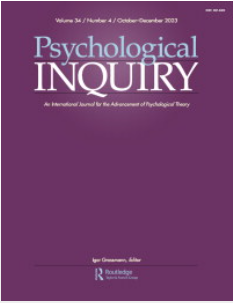多么伟大的资本意识形态!将意识形态选择视为资本主义消费过程
IF 4.1
2区 心理学
Q1 PSYCHOLOGY, MULTIDISCIPLINARY
引用次数: 0
摘要
在《天使在美国:佩雷斯特罗卡》的开场白中,“世界上现存最古老的布尔什维克”阿列克西·安德迪鲁维亚诺维奇·普雷拉普萨里亚诺夫在苏联帝国解体前不久向克里姆林宫发表了演讲(库什纳,1996年)。他的演讲赞扬了布尔什维克的事业,并表达了对改革派的失望。乍一看,普雷拉普萨里亚诺夫似乎是非理性理论家的讽刺;他的中间名(“洪水之前”)和姓氏(“瀑布之前”)突显了他是如何顽固地坚持一个垂死体系的创始意识形态的。然而,当我们听他的独白时,我们可以看到非理性的表面表现,找到人类对意识形态需求的令人信服的解释。令人惊讶的是,对于马列主义者来说,这个角色并不强调意识形态对促进阶级物质利益的价值;相反,他关注的是意识形态如何满足对意义、结构、,和目的:“你无法想象,当我们第一次阅读《经典文本》时,在我们无知和恐惧的黑暗烦恼的夜晚,当种子词发芽并将不理解抛在一边时,当令人难以置信的血腥蔬菜斗争一直持续到《红花盛开》给了我们实践,真正的实践,与现实生活相结合的真正理论”(库什纳,1996年,第14页)。他甚至用一个生动的比喻来表明,如果没有一种意识形态来保护我们免受威胁的世界的伤害,我们将是多么的失落:“如果蛇在新皮肤准备好之前脱下了皮,那么它将赤身裸体地生活在这个世界上,成为混乱力量的猎物”(第14页)。Prelapsarianov表示,只要改革派能够提供更好的意识形态产品来满足他的需求,他就愿意改变主意:“只要给我看《理论》,我就会在路障前,给我看下一本《美丽理论》的书,我向你保证,这些失明的眼睛会再次看到,只是为了阅读它,吞噬那本书。让我看看那些会重新安排世界秩序的词语,否则就保持沉默”(Kushner,1996年,第14页)。只是他对改革者提供的意识形态选择印象不深:“你能提供什么?市场激励?美国奶酪汉堡?淡化布哈里主义的临时资本主义!新经济政策制定者!”(第14页)。因此,表面上看似顽固、非理性的僵化,实际上可能反映出对个人认为合理满意的唯一意识形态选择的承诺。尽管将布尔什维克描绘成一个正在购买最佳意识形态产品的顾客无疑是一种讽刺,但这种场景与Gries、M€uller和Jost(本期)在目标文章中提出的意识形态选择的理性选择模型有着有趣的相似之处。他们的模型认真对待人们熟悉的“思想市场”隐喻,并将经济学的理性选择建模工具与动机社会认知的理论和研究的见解相结合,以正式说明个人如何从任何可用的选择中选择意识形态立场。本文章由计算机程序翻译,如有差异,请以英文原文为准。
What a Capital Ideology! Framing Ideological Choice as a Capitalist Consumer Process
In the opening scene of Angels in America: Perestroika, Aleksii Antedilluvianovich Prelapsarianov, “the world’s oldest living Bolshevik,” delivers a speech to the Kremlin shortly before the collapse of the Soviet Empire (Kushner, 1996). His speech glorifies the Bolshevik cause and voices disappointment with the Perestroika reformers. At first glance, Prelapsarianov seems like the very caricature of the irrational ideologue; his middle name (“before the Flood”) and last name (“before the Fall”) highlight how he is stubbornly clinging to the founding ideology of a dying system. Yet when we listen to his monologue we can see past the surface appearance of irrationality to find a compelling account of the human need for ideology. Surprisingly for a Marxist-Leninist, the character does not emphasize the value of ideology for advancing class-based material interests; rather, he focuses on how ideology can satisfy deeper cravings for things like meaning, structure, and purpose: “You can’t imagine, when we first read the Classic Texts, when in the dark vexed night of our ignorance and terror the seedwords sprouted and shoved incomprehension aside, when the incredible bloody vegetable struggle up and through into Red Blooming gave us Praxis, True Praxis, True Theory married to Actual Life” (Kushner, 1996, p. 14). He even gives a vivid analogy to suggest how lost we would be without an ideology to shield us from a threatening world: “If the snake sheds his skin before a new skin is ready, naked he will be in the world, prey to the forces of chaos” (p. 14). Prelapsarianov indicates that he is open to changing his mind if only the Perestroika reformers were able to offer a better ideological product to satisfy his needs: “[O]nly show me the Theory, and I will be at the barricades, show me the book of the next Beautiful Theory, and I promise you these blind eyes will see again, just to read it, to devour that text. Show me the words that will reorder the world, or else keep silent” (Kushner, 1996, p. 14). It is just that he is not very impressed by the ideological options that the reformers are offering: “What have you to offer in its place? Market Incentives? American Cheeseburgers? Watered-down Bukharinite stopgap makeshift Capitalism! NEPmen!” (p. 14). So, what on the surface may look like a stubborn, irrational rigidity may actually reflect commitment to the only ideological option that the individual finds reasonably satisfying. Although it is certainly ironic to depict a Bolshevik talking as if he is a customer shopping for the best available ideological product, this scenario has an intriguing resemblance to the rational choice model of ideological selection that Gries, M€ uller, and Jost (this issue) present in the target article. Their model takes seriously the familiar metaphor of a “marketplace of ideas” and combines the tools of rational choice modeling from economics with insights from theory and research on motivated social cognition to provide a formal account of how individuals select an ideological position from whatever options are available to them.
求助全文
通过发布文献求助,成功后即可免费获取论文全文。
去求助
来源期刊

Psychological Inquiry
PSYCHOLOGY, MULTIDISCIPLINARY-
CiteScore
10.30
自引率
1.10%
发文量
31
期刊介绍:
Psychological Inquiry serves as an international journal dedicated to the advancement of psychological theory. Each edition features an extensive target article exploring a controversial or provocative topic, accompanied by peer commentaries and a response from the target author(s). Proposals for target articles must be submitted using the Target Article Proposal Form, and only approved proposals undergo peer review by at least three reviewers. Authors are invited to submit their full articles after the proposal has received approval from the Editor.
 求助内容:
求助内容: 应助结果提醒方式:
应助结果提醒方式:


